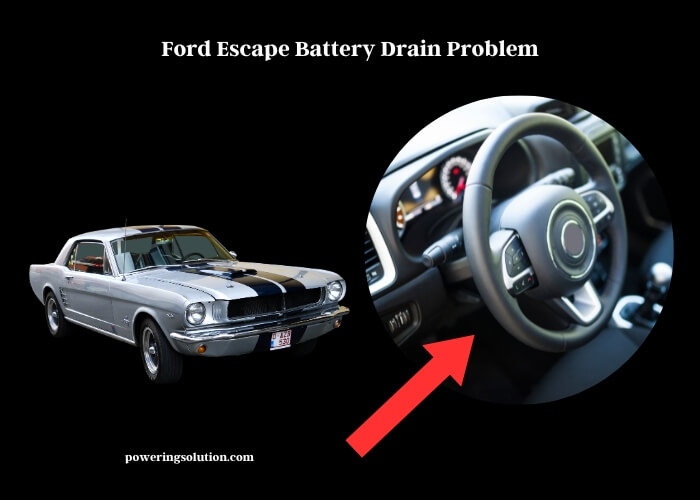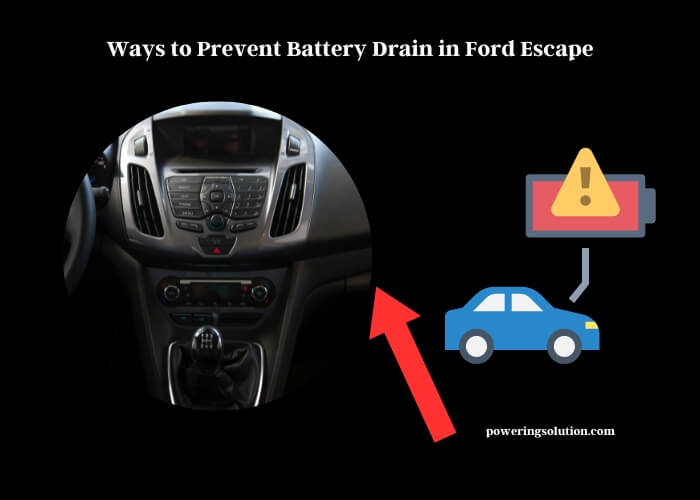Ford Escape battery drain problem is a common issue often faced by owners, indicating the battery’s power is being used up even when the vehicle is turned off. It typically stems from multiple causes that, combined, lead to this energy depletion.
Parasitic drain stands as one of the primary factors that can cause battery drain. This refers to power-consuming devices or components that continue to draw energy from the battery when the vehicle is off. In addition, electrical faults in the vehicle’s wiring system may create a path for electricity to flow and deplete the battery.

Alternator issues also play a critical role in this problem. The alternator should charge the battery when the vehicle is running, but if it’s not working properly, it can drain the battery instead. Similarly, faulty relays and defective fuses can disrupt the electrical circuit, leading to battery depletion.
Furthermore, ignition switch problems can result in power being supplied to the car’s electrical components even when the ignition is off. This could also be due to a malfunctioning battery, unable to hold a charge, or worn-out cables that impede proper power transfer.
Outdated software can also lead to issues with power management. A software update may fix battery draining problems caused by this reason. Poor grounding, too, can lead to irregularities in the electric flow, thus draining the battery.
In summary, the Ford Escape battery drain problem is a multi-faceted issue, originating from several potential causes that car owners should be aware of. Regular maintenance and timely repairs are the best ways to prevent such problems.
Background on the Ford Escape Battery Drain Problem
The Ford Escape, a popular compact SUV, has seen instances of a peculiar problem – battery drain. This recurring issue affects the overall performance of the vehicle, specifically in terms of electrical systems and startup. The crux of this problem lies in the unexpected loss of battery charge, even when the vehicle is not in use. This article aims to provide a practical guide on the causes, symptoms, and solutions to this problem.
Symptoms Signifying Battery Drain Issues in Ford Escape
Vehicle Startup Difficulties
One of the first signs of a battery drain issue in a Ford Escape is difficulty in starting the vehicle. The engine may take longer than usual to start, or you may need to turn the ignition key multiple times. It’s a clear indication that the battery is not able to supply enough power to start the engine.
Dim Lights and Other Electrical Malfunctions
Another sign of battery drain problems is when the vehicle’s headlights and interior lights appear dimmer than usual. Additionally, if other electrical systems such as the infotainment system, power windows, or air conditioning behave erratically or fail to function, it can be attributed to a battery drain issue.
List of Common Symptoms Indicating Battery Drain Issues
| Symptoms | Potential Causes |
| Vehicle startup difficulties | Battery drain |
| Dim lights | Electrical faults |
Main Causes Leading to Battery Drain in Ford Escape
Parasitic Drains and Their Effects
Parasitic drains occur when certain electrical components continue to consume power even after the engine is switched off. These components could range from dashboard clocks, alarms to faulty switches or circuits. Parasitic drains can deplete the battery over time, leading to battery drain problems.
Age and Health of the Battery
Like any other component, the performance of a car battery diminishes with age. An old or weak battery may not hold charge as effectively as it used to, leading to frequent battery drain issues.
Faults in the Electrical System
Faulty wiring, blown fuses, or malfunctioning electrical devices can cause excessive power draw, leading to battery drain. Identifying these faults requires a thorough inspection of the vehicle’s electrical system.
Ignition Switch Malfunction
A malfunctioning ignition switch can disrupt the power supply, causing erratic function or complete power failure. This can also lead to significant battery drain.
Overview of Causes for Battery Drain in Ford Escape
| Causes | Effect on Battery | Solution |
| Parasitic drains | Rapid battery discharge | Inspection and repair |
| Ageing battery | Reduced performance | Replacement |
| Electrical faults | Intermittent function | Diagnostics and repair |
| Ignition switch malfunction | Inconsistent power supply | Replacement |
Steps to Diagnose Ford Escape Battery Drain Problem
Preliminary Inspection of the Battery and Cables
Begin by checking the physical condition of the battery and cables. Look for signs of corrosion on the battery terminals and ensure that the cables are securely connected.
Use of a Multimeter to Detect Parasitic Drain
A multimeter can be used to measure the electrical current when the vehicle is off. If the current reading is higher than normal, it indicates a parasitic drain which needs to be traced and fixed.
Testing the Alternator
The alternator plays a crucial role in recharging the battery. A malfunctioning alternator can result in battery drain. Use a multimeter to test the output voltage of the alternator and compare it with the standard values in the Ford Escape’s manual.
Solutions for Resolving the Ford Escape Battery Drain Problem
Addressing Electrical System Faults
Once you’ve identified electrical system faults as the cause, start by checking the fuses and wiring. Blown fuses need to be replaced, while faulty wiring requires professional repair. Remember, attempting to fix electrical faults without adequate knowledge can be risky and cause further damage.
Detecting and Fixing Parasitic Drains
Parasitic drains can be traced by monitoring the drop in voltage as each fuse is removed. Once the offending circuit is found, it can be repaired or replaced. In some cases, you might need professional help to rectify the problem.
Replacing a Malfunctioning Ignition Switch
If the ignition switch is identified as the cause of the battery drain, replacing it is usually the best solution. Ignition switch replacement is a delicate process and is best carried out by a professional mechanic.
Battery Replacement
If the battery is old and not holding charge efficiently, it may be time to replace it. Newer battery models offer better performance and longevity. It is advisable to choose a battery that matches the specifications of the Ford Escape.
Ways to Prevent Battery Drain in Ford Escape
Regular Battery and Electrical System Checks
Regular inspection of the battery and the electrical system can help detect potential issues early. This includes checking the battery voltage, looking for corrosion, and ensuring the cables are tight and secure.

Best Practices for Storing Your Ford Escape
If the vehicle is not used frequently, it’s crucial to disconnect the battery to prevent slow discharge. Alternatively, consider using a trickle charger to maintain battery charge during extended periods of inactivity.
Importance of Alternator Maintenance
Regularly inspect and maintain the alternator to ensure it’s recharging the battery efficiently. This includes checking the alternator belt for wear and tear and ensuring that the alternator’s output voltage is within the specified range.
Impact of Battery Drain on Ford Escape’s Performance
Effect on Electrical System and Driving Experience
A drained battery can lead to several performance issues. These include difficulty in starting the engine, dimmed lights, and other electrical malfunctions. These issues can significantly degrade the driving experience.
Safety Concerns and Potential Reduction in Vehicle Lifespan
Battery drain issues can also compromise safety. For instance, dimmed headlights can impair visibility at night. Also, frequent battery drain and associated electrical problems can potentially reduce the overall lifespan of the vehicle.
Real-life Examples: Experiences of Ford Escape Owners
Case study 1: Dealing with an Unexpected Parasitic Drain
An owner faced an unusual battery drain problem. After numerous unsuccessful attempts at troubleshooting, it was discovered that a faulty door switch was causing a parasitic drain. The switch was replaced, solving the battery drain problem.
Case study 2: Managing an Aging Battery
In this case, an owner had to replace the battery frequently. The battery was old and could not hold charge efficiently. After replacing the battery with a newer model, the battery drain issue was resolved.
Case study 3: Dealing with a Faulty Ignition Switch
A Ford Escape owner had difficulty starting the car and faced frequent battery drain. The issue was traced back to a faulty ignition switch. Replacing the switch resolved the battery drain problem and improved the vehicle’s performance.
FAQs
What Are the Symptoms of a Dead Battery in a 2013 Ford Escape?
The symptoms of a dead battery in a 2013 Ford Escape include difficulty in starting the vehicle, dimmed headlights and interior lights, as well as erratic functioning of the infotainment system, power windows, and air conditioning.
Can Toyota True Start Batteries Help Solve Ford Escape Battery Drain Problems?
Yes, the Manufacturer of Toyota True Start batteries can definitely help solve Ford Escape battery drain problems. With their advanced technology and reliable performance, Toyota True Start batteries are a great solution to keep your vehicle running smoothly and prevent unexpected battery drain issues.
How Can I Minimize Battery Drain in My Ford Escape?
To minimize car alarm battery draining in your Ford Escape, consider turning off unnecessary electrical loads. Make sure the car alarm system is not faulty or overly sensitive. Regularly check the battery health and consider investing in a higher quality battery to reduce the risk of unexpected drain.
Can a 2014 Ford Escape Have Battery Problems?
Yes, a 2014 Ford Escape can have battery problems. These may be due to age, a parasitic drain, faults in the electrical system, or a malfunctioning ignition switch. Regular battery and electrical system checks are recommended to detect and rectify issues.
Can Replacing the Battery in a Ford Escape Solve the Battery Drain Problem?
Replacing the battery in a Ford Escape can indeed solve the battery drain problem, allowing you to power your devices without any issues. By installing a new battery, you ensure a reliable source of power that can support all the electrical components in your vehicle, preventing any drain and maintaining sufficient energy for your devices to function properly.
Why Does My Ford Escape Battery Keep Dying?
Your Ford Escape battery could be dying due to several reasons such as parasitic drains, an aging battery, faults in the electrical system, or a faulty ignition switch. It’s advisable to diagnose and address these issues promptly to prevent further complications.
Are There Common Battery Drain Problems in the 2018 Ford Escape?
Yes, some owners of the 2018 Ford Escape have reported battery drain problems. These issues can be due to parasitic drains, an old or weak battery, faults in the electrical system, or a malfunctioning ignition switch.
Is Battery Drain a Common Problem in the 2017 Ford Escape?
Yes, battery drain can occur in the 2017 Ford Escape, often resulting from parasitic drains, an aging battery, electrical faults, or a malfunctioning ignition switch. Regular inspection and maintenance can help prevent such issues.
Does a Battery Light on a Ford Escape Indicate a Problem?
Yes, if the battery light on your Ford Escape is on, it could indicate a problem with the charging system. It might be a sign of an alternator issue or a potential battery drain problem. Immediate professional inspection is recommended in such cases.
What’s the Process for a 2017 Ford Escape Battery Replacement?
To replace the battery in a 2017 Ford Escape, first, disconnect the negative battery cable, then the positive. Remove the battery hold-down clamp and take out the old battery. Insert the new battery, reinstall the clamp, and reconnect the positive cable first, then the negative. Remember to reset your vehicle’s systems as needed. It’s always best to have a professional handle battery replacement to ensure safety and proper installation.
Read more:
- Can I Use D2 Batteries Instead of D?
- Solving the Puzzle: Why Your 18650 Battery Won’t Charge
- Resolving Toyota RAV4 Radio Not Working After Battery Change
- GMC Acadia Battery Saver Active Won’t Start
- Golf Cart Batteries Bubbling When Charging: Explained
- A Detailed Guide on Hex Wasp Battery Issues and Fixes
References
